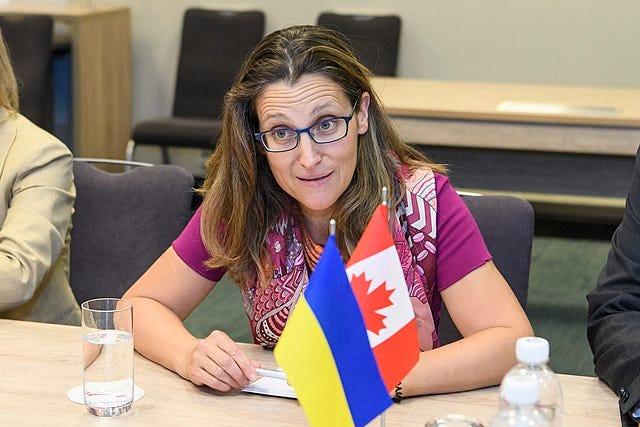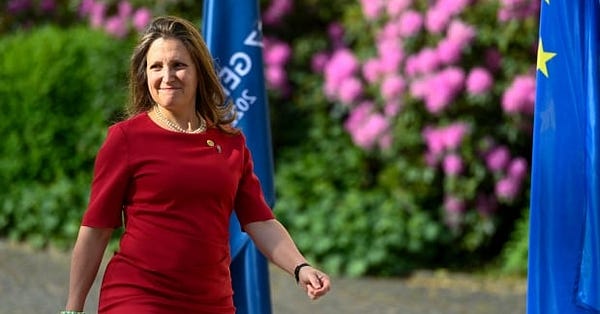The problem with selling Russian assets for Ukraine
How proposed Canadian legislation violates international law

An international legal expert is raising concerns about the Liberal legislation that will allow the Canadian government to seize assets from sanctioned Russians and reroute the proceeds towards Ukraine, which is being considered as part of the 2022-23 budget implementation Bill C-19, CBC News reports.
If the legislation is passed, it will make Canada the first G7 nation to allow the sale of seized Russian assets for Ukraine’s benefit.
Thus far, CBC is the only mainstream Canadian media outlet to question the legality of this legislation.
Under the United Nations Articles on the Responsibility of States for Internationally Unlawful Acts, measures to repel states’ illegal acts "shall, as far as possible, be taken in such a way as to permit the resumption of performance of the obligations in question." In other words, they must be reversible.
"Once those proceeds, and notably Russian assets, have been handed over to, say, the Ukrainian government, they're lost. They cannot be returned," says David Kleimann, an international legal adviser who is a fellow with Brussel-based think tank Bruegel.
"Therefore there's no way of inducing the resumption of performance of international obligations."
Kleimann doesn’t deny punitive actions ought to be taken against Russia for its illegal invasion of Ukraine, but he insists they must be consistent with international law.
CBC News reporter Janyce McGregor notes a murkiness about what the bill would actually do in practice:
C-19 doesn't specify — and ministers have never made clear — exactly who could receive Canada's proceeds. Would funds be transferred to trusted international organizations that perform humanitarian or reconstruction work, or handed over directly to the Ukrainian government? And if the latter, what safeguards would Canada implement …
The potential value of real estate or financial assets in Canada subject to these sanctions is unknown, so it's unclear how valuable they might be to Ukraine's recovery. It's also hard to evaluate whether these new powers are a significant deterrent for Russia, or merely symbolic.
At a G7 meeting, Finance Minister Chrystia Freeland floated the idea of allowing Russian oligarchs to buy their way out of sanctions, the proceeds of which would go towards rebuilding Ukraine, the Associated Press reported.
Kleimann cautions that passing legislation without firm legal foundation could be weaponized against Canada in the future.
"We go back to the law of the jungle, and that makes Western assets very much vulnerable to seizure, confiscation and using those proceeds for other purposes. And that is not necessarily something that Western countries would like to see, I imagine,” he told the CBC.
McGregor reached out to the offices of Freeland and Global Affairs Minister Mélanie Joly about whether they sought advice about the legality of C-19, receiving in response a generic statement about how all legislation goes through "rigorous legal analysis" before being introduced in parliament.
While the CBC piece only spoke to one international legal expert, lawyers John Boscariol and Sean Stephenson chimed in on Twitter in agreement.




Craig Martin, a Washburn University law professor, authored a report for the dovish Ottawa-based Rideau Institute, where he is a senior fellow, exploring how the legality of various sanctions regimes should inform Canadian foreign policy.
“It is difficult to see what basis in international law Canada (or any other country) could claim to have for seizing the assets of Russia, and transferring them to Ukraine,” he told me via email.
In his report, he outlines the danger of violating international law for the ostensible purpose of upholding it:
There is not just the risk that a contradiction between policy and espoused values and principles could give rise to highly negative perceptions of hypocrisy, which exact their own strategic costs; but Canada must also be mindful of the role that it plays in the shaping of international law. Customary international law in particular is formed by state practice, and Canadian policy makers need to consider carefully the nature of the legal regime that they are helping to develop. They need to think normatively about what they want the law to look like in the future.
In other news …
More police incompetence revealed at Portapique shooting inquiry
For some inexplicable reason, it took the Nova Scotia RCMP three hours to notify the public that mass shooter Gabriel Wortman was driving a replica RCMP car on April 19 — the morning after he killed 13 people. He would go on to kill nine more.
The Mounties received information about Wortman and his vehicle’s appearance at 7:27 a.m., which was followed by a tweet identifying Wortman at 8:54 a.m. A tweet including the vehicle description didn’t come out until 10:17 a.m., despite police having received both pieces of information at the same time.
Around the time the tweet with full details was sent out, Nova Scotia Provincial Emergency Management offered to use the province’s formal emergency alert system to notify the public, but this never occurred and Wortman was killed in a shootout at 11:26 a.m., Nova Scotia RCMP Chief Supt. Chris Leather told CTV News in the aftermath of the shooting.
This all makes much more sense when you remember Wortman was likely an RCMP asset.
Edited by Scott Schmidt



